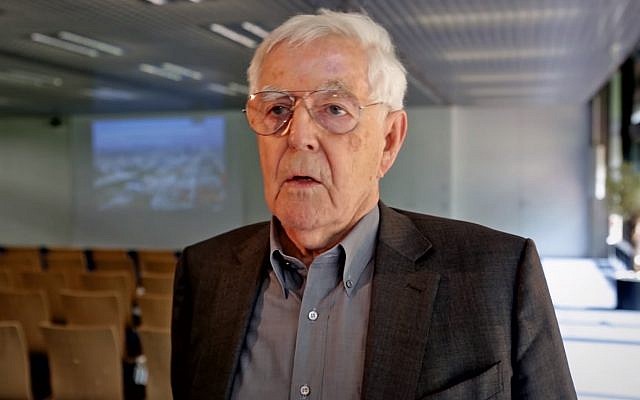How the son of ‘Hitler’s architect’ helped bring the World Cup to Qatar
Albert Speer Jr. tried to get out from under his father’s legacy, but despite his ostensibly humanitarian and eco-friendly style, he often worked for authoritarian regimes
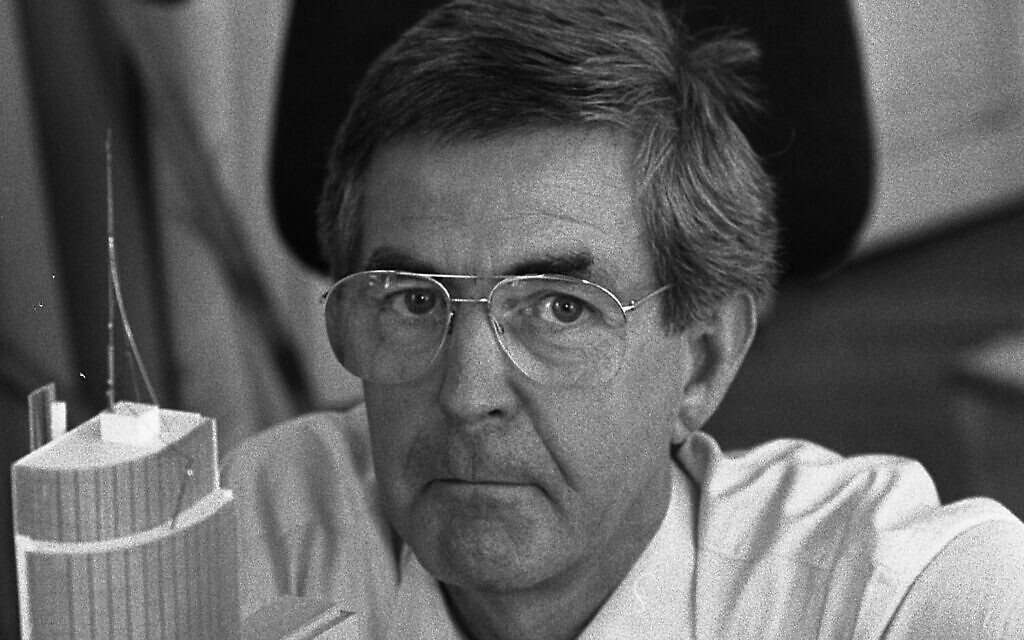 Portrait of Albert Speer Jr., oldest son of Albert Speer, Hitler's former architect and armament minister during WWII, in his office in Frankfurt am Main, West Germany, May 11, 1987. (AP Photo/Kurt Strumpf)
Portrait of Albert Speer Jr., oldest son of Albert Speer, Hitler's former architect and armament minister during WWII, in his office in Frankfurt am Main, West Germany, May 11, 1987. (AP Photo/Kurt Strumpf)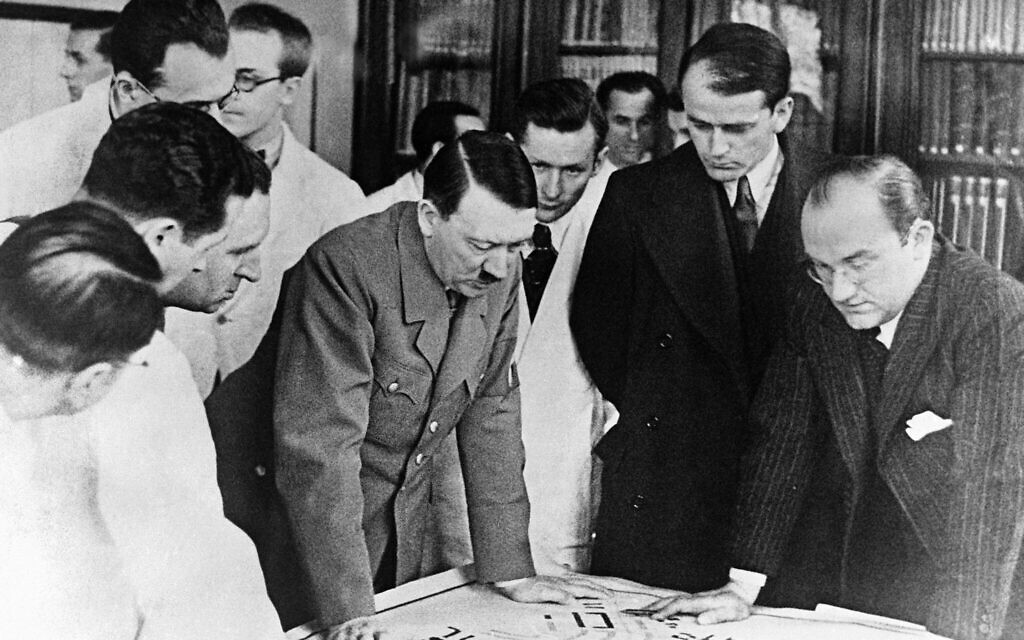 Adolf Hitler examining the plans of the new party buildings, in Nuremberg, on February 24, 1937. German architect Albert Speer, second right, looks at the drawings. (AP Photo)
Adolf Hitler examining the plans of the new party buildings, in Nuremberg, on February 24, 1937. German architect Albert Speer, second right, looks at the drawings. (AP Photo)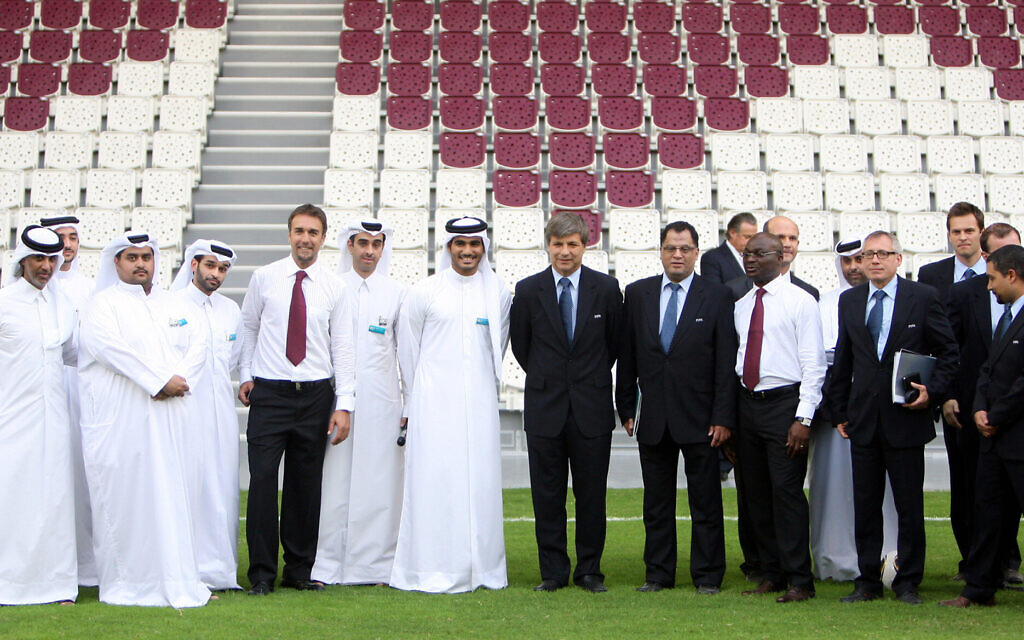 Members of the FIFA inspection group stand next to officials of the Qatar 2022 bid team as they visit a showcase stadium during the FIFA Inspection Visit for the Qatar 2022 World Cup Bid in Doha, Qatar, September 14 2010. (AP Osama Faisal)
Members of the FIFA inspection group stand next to officials of the Qatar 2022 bid team as they visit a showcase stadium during the FIFA Inspection Visit for the Qatar 2022 World Cup Bid in Doha, Qatar, September 14 2010. (AP Osama Faisal)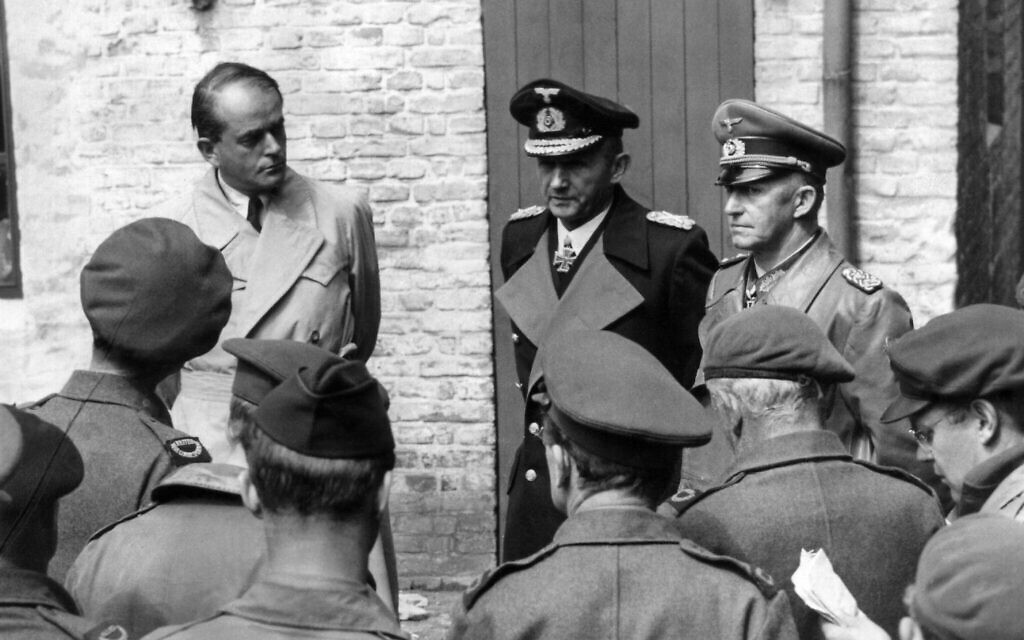 Following their arrest at Flensburg, Germany on May 24, 1945, Admiral Karl Doenitz and aides answer questions of war correspondents. Left to right: Reich Production Minister Albert Speer, Grand Admiral Karl Doenitz and Col. General Gustav Jodl. (AP Photo/Henry Griffin)
Following their arrest at Flensburg, Germany on May 24, 1945, Admiral Karl Doenitz and aides answer questions of war correspondents. Left to right: Reich Production Minister Albert Speer, Grand Admiral Karl Doenitz and Col. General Gustav Jodl. (AP Photo/Henry Griffin)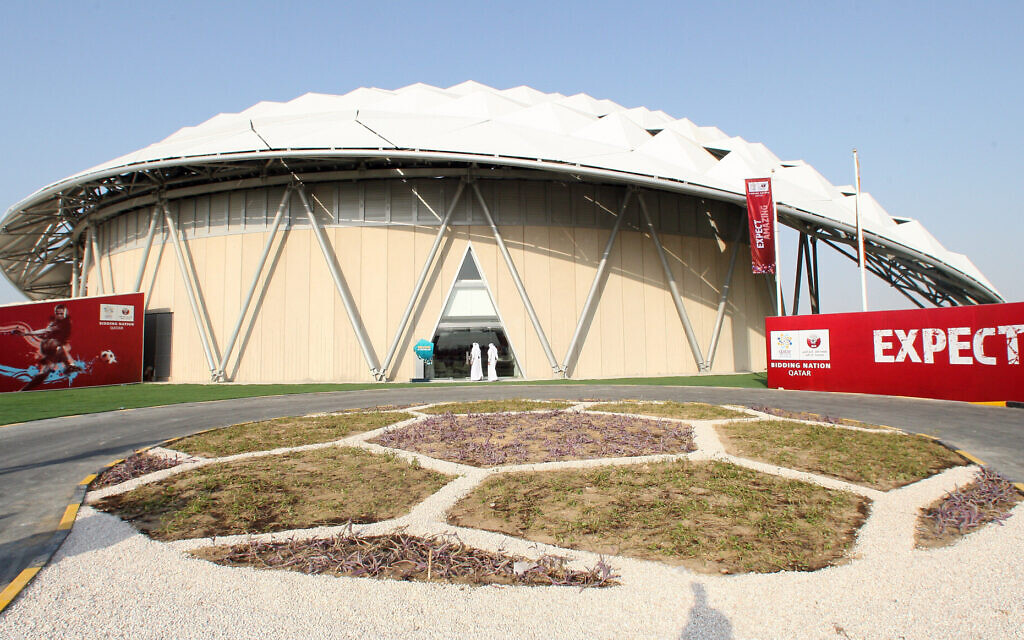 A showcase stadium photographed during the FIFA Inspection Visit for the Qatar 2022 World Cup Bid, in Doha, Qatar, SeptEMBER 14 2010. (AP Osama Faisal)
A showcase stadium photographed during the FIFA Inspection Visit for the Qatar 2022 World Cup Bid, in Doha, Qatar, SeptEMBER 14 2010. (AP Osama Faisal)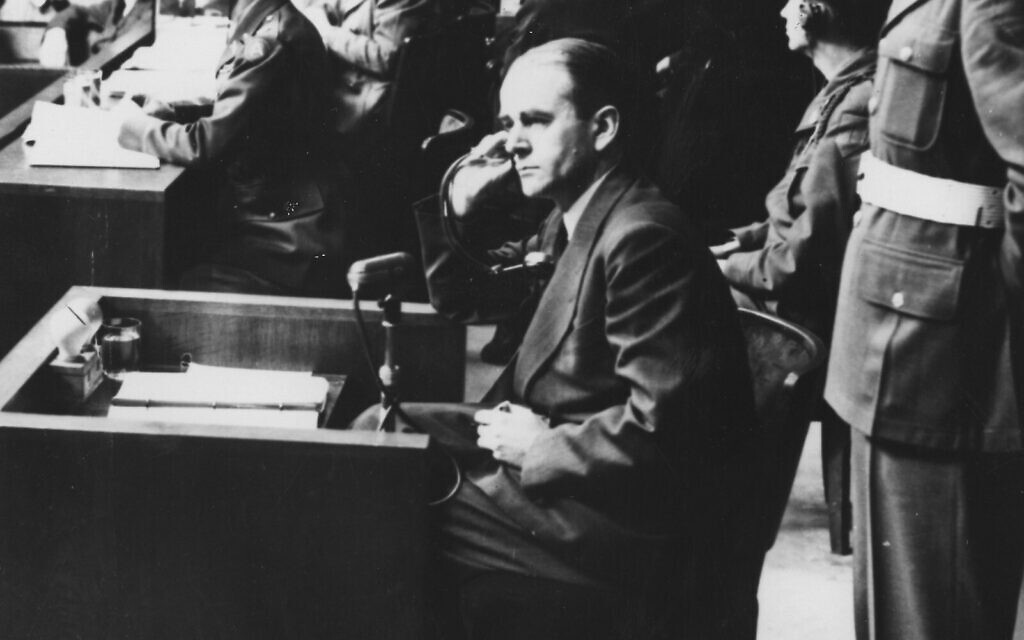 FILE - In this September 12, 1946 file photo, Albert Speer, Hitler's former architect and armament minister during WW II, a defendant in the war crimes trial at Nuremberg, Germany is pictured in court in Nuremberg. (AP Photo, file)
FILE - In this September 12, 1946 file photo, Albert Speer, Hitler's former architect and armament minister during WW II, a defendant in the war crimes trial at Nuremberg, Germany is pictured in court in Nuremberg. (AP Photo, file)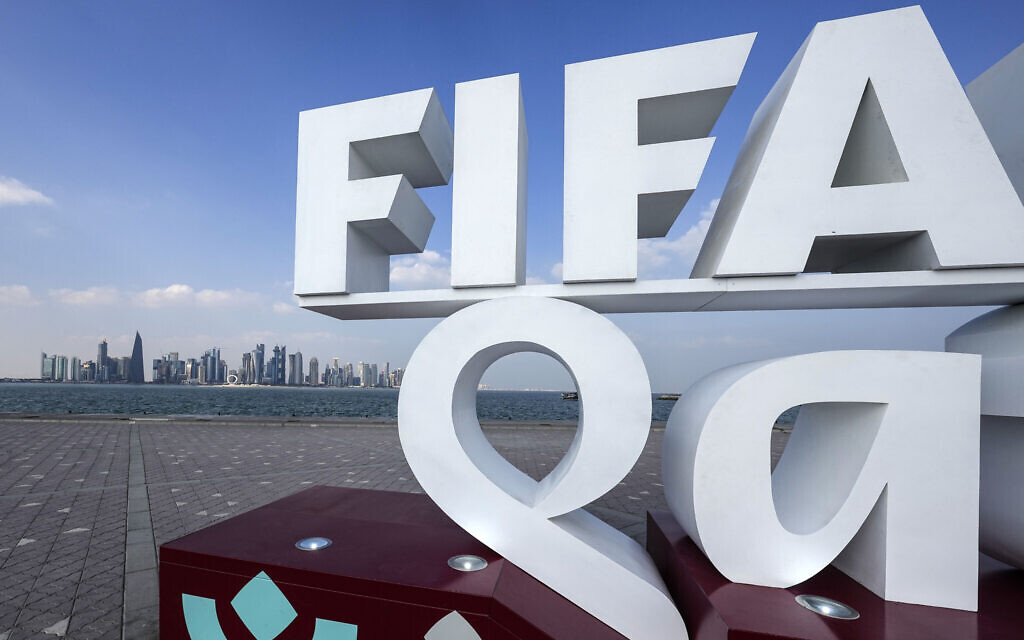 A FIFA lettering is pictured in front of the Doha skyline during the Soccer World Cup in central Doha, Qatar, on December 12, 2022. (AP Photo/Martin Meissner)
A FIFA lettering is pictured in front of the Doha skyline during the Soccer World Cup in central Doha, Qatar, on December 12, 2022. (AP Photo/Martin Meissner)
LONDON — It is perhaps apt that the man who helped bring the World Cup to Qatar — one of the most controversial sporting events since the Berlin Olympics of 1936 — was the son of “Hitler’s favorite architect.”
It is not, however, a comparison that the now-deceased Albert Speer Jr. would have welcomed.
Speer, one of Germany’s most successful postwar urban planners and architects, spent much of his life attempting to escape the long and dark shadow of his father’s role in Hitler’s court and the Third Reich’s war machine.
“I have tried my whole life to separate myself from my father, to distance myself,” he told Süddeutsche Zeitung in 2010. “I can’t help it,” he said on another occasion when asked about his notorious name and family. “It is as it is.”
But there was a peculiar paradox at the heart of Speer’s life. His eco-friendly architecture — which he insisted must have a “human dimension” — consciously rejected the megalomaniacal, overbearing monumentalism of his Nazi father’s work. Speer Jr. nonetheless frequently put himself at the service of brutal, autocratic regimes, including Qatar, Saudi Arabia and China.
As The New Yorker magazine tartly put it in a detailed exploration of his “complicated architecture” five years ago: “His sense of moral rectitude has not kept him from working with authoritarian governments.”
Speer, who died in 2017 at the age of 83, cannot have been unaware of this paradox. Having devised the “masterplan” with which the Qataris convinced FIFA to allow it to stage the World Cup, he later bridled at being associated with the mounting human toll of his grand desert design and stopped speaking to the press.
In all, it is suspected that hundreds of migrant workers may have died working on a project which has also been dogged by concerns about Qatar’s abysmal human rights record, allegations of rampant corruption, and the staggering environmental cost of staging a soccer tournament in “a sweltering petrostate” with the highest per capita carbon emissions in the world.
Born into a dark legacy
At the time of Speer Jr.’s birth in late July 1934, his father, who had joined the Nazi party three years prior, was already a rising star. Thanks to his work on the 1933 Nuremberg rally and the rebuilding of the Reich Chancellery, Speer Sr. had come to Hitler’s attention and, in January 1934, been appointed the party’s chief architect.
The two men became increasingly close, as Speer Sr. conceded at his trial in Nuremberg in 1946. “If he had been capable of [friendship], I would indubitably have been one of his closest friends,” he said.
In reality, the relationship was much more complex.
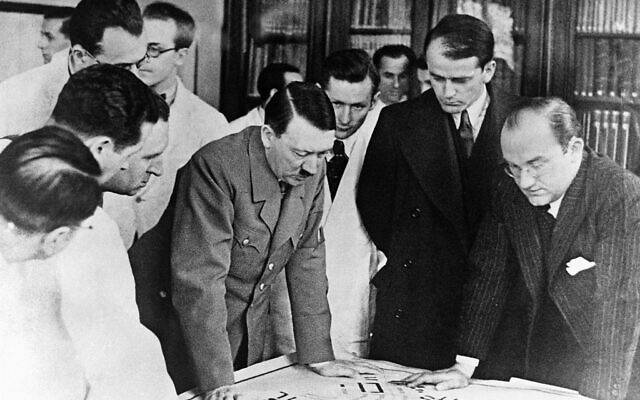
“I unreservedly admired him, could see no fault in him and honestly could hardly believe my luck,” Speer later told the historian Gita Sereny, who interviewed him repeatedly over a three-year period for her 1995 book “Albert Speer: His Battle with Truth.”
Indeed, one of Sereny’s interviewees described an “unspoken love” between Hitler and his chief architect. “For Hitler, Speer was the son he never had; for Speer, at least in the beginning, Hitler was the father he wished he could have had,” Sereny later wrote.
Certainly, Hitler’s faith in Speer’s abilities saw him rise rapidly, amassing huge wealth and power along the way. By 1937, Hitler appointed Speer as Berlin’s chief building inspector with sweeping powers and a brief to redesign the Reich capital. Their shared vision, “Germania,” was ultimately unrealized but Speer’s efforts came at a great cost. Thousands of Jews were forcibly displaced from their homes as Berliners were shunted away from parts of the city which were to be torn down. Countless others perished in the camps as they labored to provide the bricks and quarry the stone needed to rebuild the city.
At the heart of the plan was a seven-kilometer (4.3-mile) north-south grand avenue with a People’s Hall, which would hold 180,000 and whose dome would rise more than twice as high as St. Peter’s in Rome. Also on the grand avenue would be a Great Arch three times the size of Paris’s Arc de Triomphe, commemorating Germany’s triumph over its enemies and glorious war dead.

“While the scale is still hard to imagine, what is clear is that Berlin would have been transformed from being an attractive living space for its citizens into a daunting, theatrical expanse, the main purpose of which would have been to allow the state to show itself off,” posits Kate Connolly in The Guardian. “Architects and urban planners who have analysed the city in recent years claim it would probably have been nightmarish to live in: hostile to pedestrians, who would regularly have been sent underground to cross streets, and with a chaotic road system… Citizens would have been made to feel variously impressed and inhibited by the towering structures around them.”
A ‘normal childhood’ with Uncle Hitler
The outbreak of war slowed and then halted Speer’s plans for “Germania,” but he soon acquired huge new responsibilities. In 1942, Hitler appointed Speer Minister of Armaments and head of the massive Nazi construction giant, the Organization Todt. Speer’s growing empire saw him overseeing the use of slave labor and work on the expansion of the Nazi camps.
“What luck to have Speer; we work splendidly together — at last a kindred mind,” propaganda minister Josef Goebbels rejoiced in his diary.
By 1943, Speer had become, in the words of Hitler’s short-lived successor, Adm. Karl Donitz, “Europe’s economic dictator,” as he assumed control of much of the Ministry of Economics. Later that year, Hitler made him Reich Minister for Armaments and War Production.
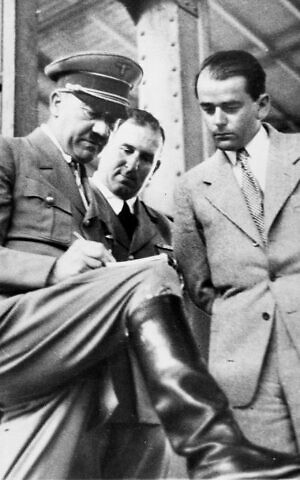
Unsurprisingly, young Albert Jr. spent much of his childhood in Berchtesgaden, close to Hitler’s Alpine retreat. While Speer later claimed it was a “totally normal childhood,” in reality it was anything but. His father was a workaholic, remote, and often absent.
“He was not the kind of father who went over your homework,” Speer told Architecture magazine in 2000.
His sister, Hilde, recalled that their father came to the family home in Berchtesgaden “rarely. Not more than once a month. I suppose it was only when Hitler was there.” Speer’s mother, Margret, similarly said that “the children hardly knew him… For all intents and purposes, the children didn’t have a father.” Indeed, when he went on skiing trips or took a rare holiday, Speer Sr. went with his “team” and friends such as Eva Braun and Magda Goebbels, not his family.
For many years, Speer patiently if reluctantly answered journalists’ questions about his recollections of Hitler. “I was 9 or 10, and from that perspective, I imagined him like an uncle. For a child, he was a man like anybody,” he later claimed. The Fuhrer occasionally dropped by their home for a mug of cocoa, while Speer and his brothers wore lederhosen when they visited the Obersalzberg to celebrate Hitler’s birthday along with Eva Braun. “To be called to visit Hitler was almost a happy occasion. I was allowed to play with the dogs. I got sweets,” he told Süddeutsche Zeitung.
To be called to visit Hitler was almost a happy occasion. I was allowed to play with the dogs. I got sweets
This “normal childhood” began to unravel as the tide of the war turned against the Third Reich and defeat beckoned. Unlike most of his senior colleagues, Speer Sr. escaped the hangman’s noose at Nuremberg, having offered remorse and accepted responsibility for the Nazis’ crimes, while carefully claiming he knew nothing of the Holocaust as it occurred.
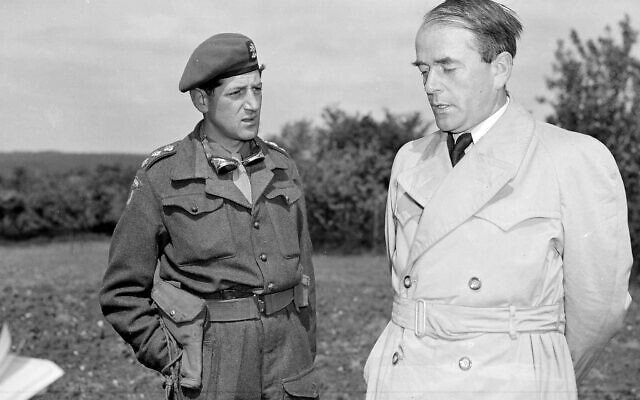
Historians later challenged these claims, but the judges believed them and he received 20 years in Spandau prison. As Roger Moore, author of “The Devils’ Alliance: Hitler’s Pact With Stalin,” wrote, Speer “seduced the Nuremberg judges with his dubious show of contrition and his measured, bourgeois civility.”
On his release from Spandau in 1966, he then “set about wooing a generation of journalists and historians, portraying himself as ‘the Good Nazi,’ an urbane eyewitness to world-changing events.”
‘With such a name, you really try hard’
The oldest of six children, 10-year-old Speer Jr. was naturally deeply affected by Nazi Germany’s defeat and his father’s arrest and began to develop a severe stutter. “I couldn’t string a sentence together,” he recalled. “The reason was probably my childhood. The stutter is why I left school. I did a carpentry apprenticeship — if you build you don’t have to talk much.”
Prison visits were initially rare — Speer didn’t see his father between the ages of 11 and 19 – and their relationship was distant. “The man whom I visited once a year in Spandau and who then came out was as foreign to me as one of my professors. An emotional connection did not exist. This had nothing do with him or my confrontation with his life,” he recounted in an interview with Architecture magazine.
Despite failing his exams and embarking on an apprenticeship, architecture was in Speer’s blood. His father, grandfather and great-grandfather were all architects. He was, however, determined to dispel any notion that his father may have played any role in his choice of career.
“I could draw well, I could express myself well, I had ideas,” he told the ZDF German broadcaster in 2005. “My father played almost no role.”
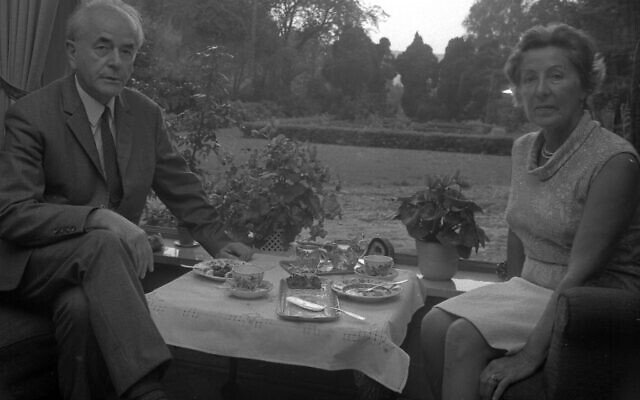
Speer went to night school and began a course in architecture in Munich’s technical university in 1955. He also battled his stutter: public speaking and a bus trip around the United States in 1964 helped him to overcome it.
Speer later claimed that he never considered changing his name. “I am the eldest son of that father and don’t see any reason to take another name,” he told Reuters. “But the name certainly didn’t help me.”
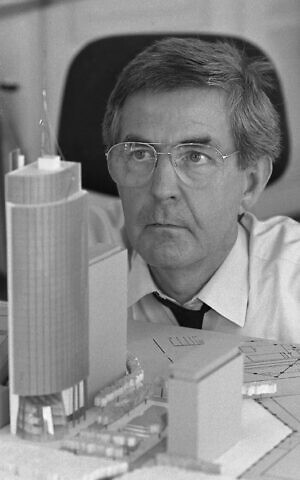
Indeed, he later recalled the shock which greeted his winning an architecture prize early in his career. “When they opened the envelope, everybody was baffled. ‘What?’ said one of the members of the jury. ‘Albert Speer? I thought he’s in jail!’ That’s how I began.”
After his first big commission to design a master plan for cities in western Libya, Speer’s career took off. By the 1970s, he was shaping the look of Frankfurt, the city from which his growing practice operated. Serving as an adviser to the city government, he designed plans for the European Central Bank’s Skytower, as well as the new Europaviertel district.
Only Berlin — “for obvious reasons,” he argued — largely eluded him. “I’ve heard about instances where we were as strong as others in competition but then it was said, ‘Does it have to be Speer? We’d prefer to take the other one,’” he told Architecture magazine.
But Speer quite consciously attempted to differentiate his work from that of his father.
The name certainly didn’t help me
“With such a name, you really try hard,” he said in an interview with Reuters. “Perhaps that’s why this office developed with a big focus on ecology, sustainability and compatible architecture, rather than preconceived architectural structures.”
“Maybe one feels especially obliged to produce humane architecture and city planning when you have had such a father. My ambition to do something for other people is something to do with the name,” Speer said.
Indeed, in an implicit rejoinder to his father’s work, Speer said in 2010: “I consider dimensions beyond 400 meters [1,300 feet] in height to be absolute madness — such buildings are inefficient and superfluous.”
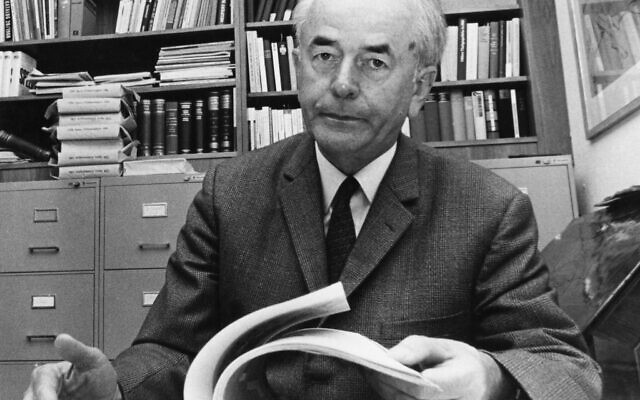
As The New Yorker magazine noted: “If Speer, Sr.’s work was a reflection of the Third Reich’s values, Speer, Jr.’s is a manifestation of Germany’s postwar identity: a country that has tried to atone for its past by becoming an international advocate for human rights and environmental sustainability, a country that is attempting to make up for its mistakes by becoming more thoughtful and humane (albeit while often advancing its own financial interests).”
Doing good jobs for bad guys
Whether for the money or the glory, throughout his career Speer accepted commissions from regimes with appalling human rights records. In Nigeria, then under military rule, his firm designed plans for the new capital of Abuja.
In Saudi Arabia, he worked on plans for the summer capital of Ta’if and a diplomatic district in Riyadh. Speer later went beyond lauding the “mixed-use development” and “water-management system that was unheard of in the Arab world at the time” of his favorite project in the Saudi capital, enthusing about the manner in which the Saudi monarch has monthly meetings with his subjects. “Everyone is admitted and heard. These are completely different ways of thinking.”
And in China, he won a commission to design Shanghai’s “German Town,” opening an office in the city in 1999. He described his work in China as “knowledge transfer” while reportedly accepting that his father’s name may have helped his many forays into the Arab world.
Bizarrely, however, when asked whether he had doubts about working in countries with autocratic regimes he insisted in 2000: “I never gave it any thought. At any rate, we’ve never worked for a dictatorship.”
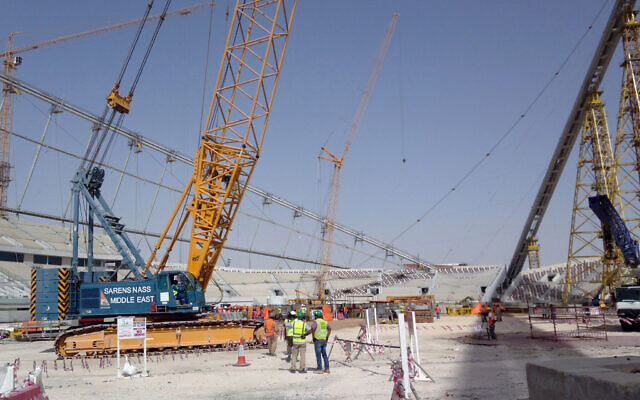
Later, he developed more creative justifications. “Generally speaking, Germans should be able to work in countries with a German embassy,” he told Der Spiegel in 2012. “We are doing something for the people when we develop a master plan for 4 to 6 million residents in Alexandria,” he continued. “This has very little to do with politics.”
Speer’s moral elasticity was, however, not endless. “We wouldn’t have worked for Gadhafi,” he added. Indeed, the German magazine detected in its interview that Speer had nonetheless “clearly had enough of this debate.”
Generally speaking, Germans should be able to work in countries with a German embassy
Comparisons with his father’s work were, perhaps, sometimes unfair. His work on Hannover’s Expo 2000 was, for instance, likened to that of Speer Sr. on the German Pavilion at the 1937 Paris Exposition. Likewise, his plans for Leipzig’s unsuccessful 2012 Olympic bid and his father’s for parade grounds at Nuremberg were compared. “In both cases, the links were largely superficial and could be taken as an apparent Speer-family proclivity for the design of global exhibition spaces,” said an obituary of Speer in the Washington Post.
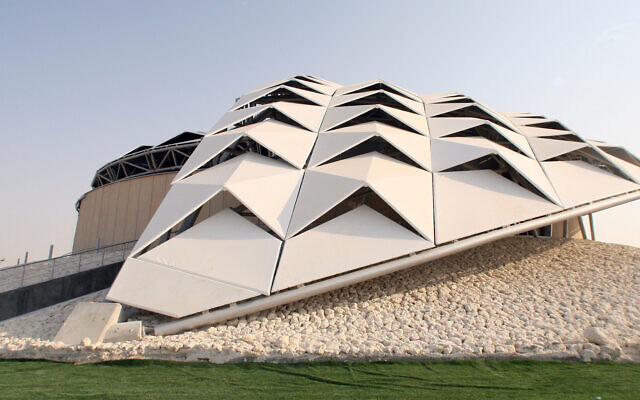
But, on other occasions, the criticisms were more justified. Controversy and much media attention, for instance, surrounded Speer’s work on the 2008 Beijing Olympics where his plans for a grand boulevard linking the Forbidden City and the stadium had uncomfortable echoes of Germania. “His Beijing axis is re-awakening old memories,” claimed a piece in Die Welt when the plans were submitted in 2003. “Wasn’t there a legendary north-south axis planned by the elder Speer for Hitler’s new Berlin, which was to be called ‘world capital Germania?’ Is his son trying to copy him, or rather outdo him?”
That hundreds of thousands of Beijing residents were to lose their homes for a plan commissioned by a self-aggrandizing regime simply deepened the eerie resemblance to his father’s Berlin masterplan.
Comparisons with my father are unfortunately unavoidable
Speer, however, rode out the criticisms. His plans were “bigger, much bigger” than those of his father for Berlin. “Comparisons with my father are unfortunately unavoidable,” he said. “What I am trying to do in Beijing is to transport a 2,000-year-old city into the future. Berlin in the 1930s — that was just megalomania.”
Speer’s attempts to justify himself were searingly punctured by Nina Khrushcheva of New York’s New School University on the eve of the games’ opening ceremony.
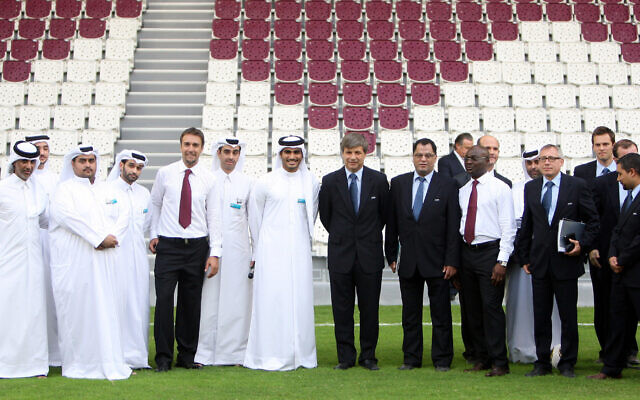
“It is no surprise that the Beijing games may resemble the hubristic games that beguiled Hitler and enthralled the German masses in 1936. Like the Beijing games, the Berlin Olympics were conceived as a coming-out party,” she wrote. “Like his father, Speer Jr. … sought to create a futuristic global metropolis. Of course, the language that he used to sell his scheme to the Chinese was very different from the words his father used to present his plans to Hitler. Instead of emphasizing his design’s pomposity, the younger Speer insisted on its environmental friendliness.”
She continued: “Of course, the sins of the father should never be visited on the son. But, in this case, when the son borrows essential elements of his father’s architectural principles and serves a regime that seeks to use the games for some of the same reasons that animated Hitler, is he not willingly reflecting those sins?”
Winning a World Cup bid
Despite the controversy, it did not appear to have occurred to Speer to reject the entreaties of the Qataris when they came calling just a year later with long-shot talk of hosting the 2022 World Cup.
“The challenge was to fulfill all of FIFA’s requirements and create the best application book the FIFA people had ever held in their hands,” Speer boasted in 2012. “And that’s what we did.”
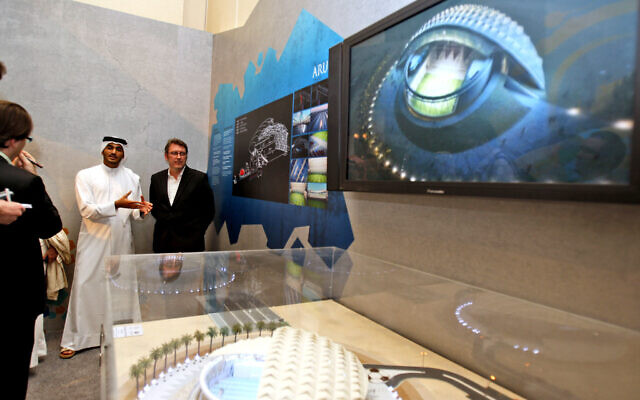
As he explained to Der Spiegel, Speer’s master plan labored hard on his trademark of sustainability — a crucial weakness for the Qataris to which he offered apparent solutions. The “white elephant” stadiums which would be able to accommodate half the country’s population, for instance, were to be modular and disassembled after the tournament to provide sports venues for “poorer countries.” And a model stadium was constructed to prove to the FIFA delegation that a carbon-neutral solar-powered cooling system could be deployed against the fierce desert temperatures.
For a time after FIFA’s shock decision to go with Qatar, Speer appeared to revel in the project. “I love the Arabs,” he declared, while revealing that, after the announcement was made, the Emir’s brother and driving-force behind the bid, Sheikh Mohammed, “called me up and said, ‘I love my Germans.’”
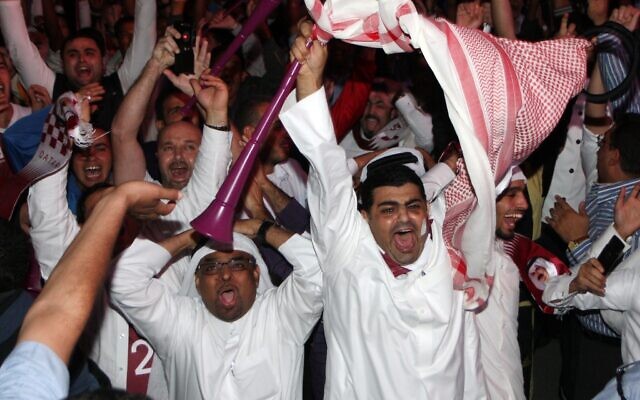
Indeed, Speer was robust in rejecting any criticism of the decision to award Qatar the tournament. Accusations that energy would be wasted were “bigoted,” he said, noting (incorrectly) that seats in Germany’s stadiums were heated in the winter. “It takes the same amount of energy to cool the seats as it does to heat them.”
Speer presented Qatar’s size as “practically ideal”; unlike when South Africa hosted the World Cup, there would be no need for fans to take flights, they would use the subway. “That’s environmentally friendly and much cheaper.” And he accused journalists of being unfair in their treatment of Qatar: “What bothers me,” he told Der Spiegel in 2015, “is that the standards are not applied all the time and in all places, just in Qatar.”
Later, as the controversies enveloping Qatar’s lack of democracy and unions and the death of migrant workers grew, Speer claimed that it was “fantastic” that “people are taking a closer look. And that things are changing.” Citing his “good business relations” with the Saudis, he said: “There is trust there, and people there listen to us as well. We really do have the feeling that we are doing something positive for the country and the people there. That is our benchmark. For Qatar as well.”
But underneath the justifications and excuses rested a darker, more bleak and pessimistic sentiment about the value and importance of freedom and democracy.
“Our democratic tradition is all of 100 years old,” he told Der Spiegel. “We can’t treat it as the only thing that counts for making people everywhere happy.”
There's no paywall on The Times of Israel, but the journalism we do is costly. As an independent news organization, we are in no way influenced by political or business interests. We rely on readers like you to support our fact-based coverage of Israel and the Jewish world. If you appreciate the integrity of this type of journalism, please join the ToI Community.

We’re really pleased that you’ve read X Times of Israel articles in the past month.
That’s why we started the Times of Israel eleven years ago - to provide discerning readers like you with must-read coverage of Israel and the Jewish world.
So now we have a request. Unlike other news outlets, we haven’t put up a paywall. But as the journalism we do is costly, we invite readers for whom The Times of Israel has become important to help support our work by joining The Times of Israel Community.
For as little as $6 a month you can help support our quality journalism while enjoying The Times of Israel AD-FREE, as well as accessing exclusive content available only to Times of Israel Community members.
Thank you,
David Horovitz, Founding Editor of The Times of Israel

